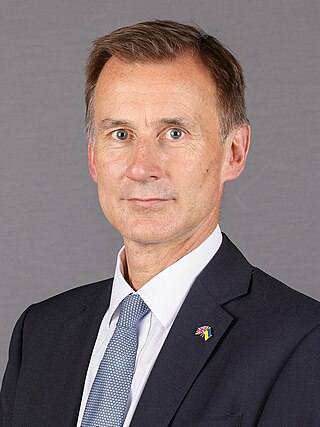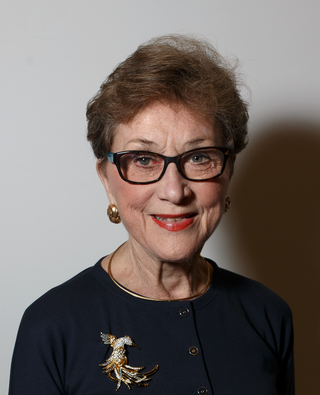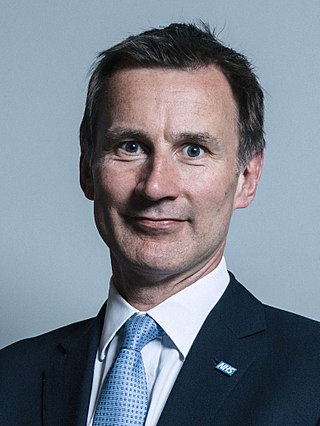In the Westminster parliamentary system, an early day motion (EDM) is a motion, expressed as a single sentence, tabled by a member of Parliament, which the Government has not yet scheduled for debate.
The British Medical Association (BMA) is a registered trade union for doctors in the United Kingdom. It does not regulate or certify doctors, a responsibility which lies with the General Medical Council. The BMA has a range of representative and scientific committees and is recognised by National Health Service (NHS) employers alongside the Hospital Consultants and Specialists Association as one of two national contract negotiators for doctors.

The Autism Awareness Campaign – United Kingdom was launched in 2000 by British parents and carers Ivan Corea and his wife Charika Corea in response to the autism diagnosis of their son, Charin.
In the United Kingdom, junior doctors are qualified medical practitioners working whilst engaged in postgraduate training. The period of being a junior doctor starts when they qualify as a medical practitioner following graduation with a Bachelor of Medicine, Bachelor of Surgery degree and start the UK Foundation Programme. It culminates in a post as a consultant, a general practitioner (GP), or some other non-training post, such as a specialty doctor or associate specialist post.

Jeremy Richard Streynsham Hunt is a British politician serving as Chancellor of the Exchequer since 2022. He previously served in the Cabinet as Secretary of State for Culture, Olympics, Media and Sport from 2010 to 2012, Secretary of State for Health and Social Care from 2012 to 2018 and Foreign Secretary from 2018 to 2019. A member of the Conservative Party, he has been Member of Parliament (MP) for South West Surrey since 2005.
Modernising Medical Careers (MMC) is a programme for postgraduate medical training introduced in the United Kingdom in 2005. The programme replaced the traditional grades of medical career before the level of Consultant. The different stages of the programme contribute towards a "Certificate of Completion of Training" (CCT). It has been dogged by criticism within and outside the medical profession, and an independent review of MMC led by Professor Sir John Tooke criticised many aspects of it.
In the United Kingdom, Ireland, and parts of the Commonwealth, consultant is the title of a senior hospital-based physician or surgeon who has completed all of their specialist training and been placed on the specialist register in their chosen speciality. Their role is entirely distinct from that of a general practitioner.
A specialty registrar (StR), previously known as and still commonly referred to as a specialist registrar (SpR), is a doctor, public health practitioner or dentist who is working as part of a specialty training programme in the UK. This is known as a training grade as these doctors are supervised to an extent, as part of a structured training experience that leads to being able to undertake independent practice in a hospital specialty or working as a general practitioner.

Dame Carol Mary Black is a British physician, academic, specialising in rheumatology. She was President of the Royal College of Physicians from 2002 to 2006, advised the British Government on the relationship between work and health from 2006 to 2016, and was Principal of Newnham College, Cambridge from 2012 to 2019. She is an expert on the disease scleroderma.
The Medical Training Application Service was an on-line application system set up under the auspices of Modernising Medical Careers in 2007 and used for the selection of Foundation House Officers and Specialty Registrars, and allocating them to jobs in the UK. Its implementation was heavily criticised both in the press and within the medical profession, and its operation was marked by the resignation of key staff and serious security breaches. The system affected junior doctors, and so every qualified doctor in the UK who had not yet attained Consultant status.

Sir Liam Joseph Donaldson is a British doctor. He was formerly the Chief Medical Officer for England, being the 15th occupant of the post since it was established in 1855. As such, he was principal advisor to the United Kingdom Government on health matters and one of the most senior officials in the National Health Service (NHS).
Doctors in Unite is a trade union for doctors in the United Kingdom. It was formerly known as the Medical Practitioners' Union (MPU) before its affiliation with Unite.

Clive Peedell is an English politician and doctor specialising in oncology. He is a co-founder and former leader of the National Health Action Party. He stood as the candidate for Witney against Prime Minister David Cameron in the 2015 United Kingdom general election.
The British Association of Physicians of Indian Origin (BAPIO) is a voluntary organisation for doctors of Indian sub-continental origin, established in 1996 and based in the United Kingdom. Its president is Ramesh Mehta of Bedford Hospital NHS Trust.
Marie-Louise Irvine is a Scottish general practitioner, health campaigner, and parliamentary candidate. She unsuccessfully stood for election in the 2015 general election and the 2017 general election for the National Health Action Party in the constituency of South West Surrey. She came second to Jeremy Hunt in the 2017 election; reducing his majority.

Jack Adcock, a 6-year-old child, was admitted to Leicester Royal Infirmary (LRI) on 18 February 2011. He died later that day, in part because of failings in his treatment. Dr Hadiza Bawa-Garba, the junior doctor who treated him and a nurse, Isabel Amaro, were subsequently found guilty of manslaughter on the grounds of gross negligence. Both were subsequently struck off their respective professional registers, although Bawa-Garba had that decision overturned at appeal. There is an ongoing debate about the judgements against Bawa-Garba, partly around Bawa-Garba's personal culpability versus a context of systemic failures, and partly around the possible use of her reflective notes about her own practice as evidence.

Jeremy Hunt served as Secretary of State for Health, later Secretary of State for Health and Social Care, from 2012 to 2018. Appointed by David Cameron, Hunt served in the Cameron–Clegg coalition and Cameron majority government. He was reappointed by Theresa May and served in the majority and minority May governments. In January 2018, Hunt gained additional responsibility for social care in England and, in June, became the longest-serving Health Secretary in British political history. He left the role when he was promoted to Foreign Secretary following the resignation of Boris Johnson, and was succeeded by Matt Hancock.
Hamish Meldrum is a British doctor who worked as a general practitioner and was Chair of the Council of the British Medical Association (BMA) 2007–2012. He took this role on after being Chair of the BMA's General Practitioners Committee (GPC) 2004–2007.

The 2022–2023 National Health Service (NHS) strikes are several ongoing industrial disputes in the publicly funded health services of the United Kingdom.









